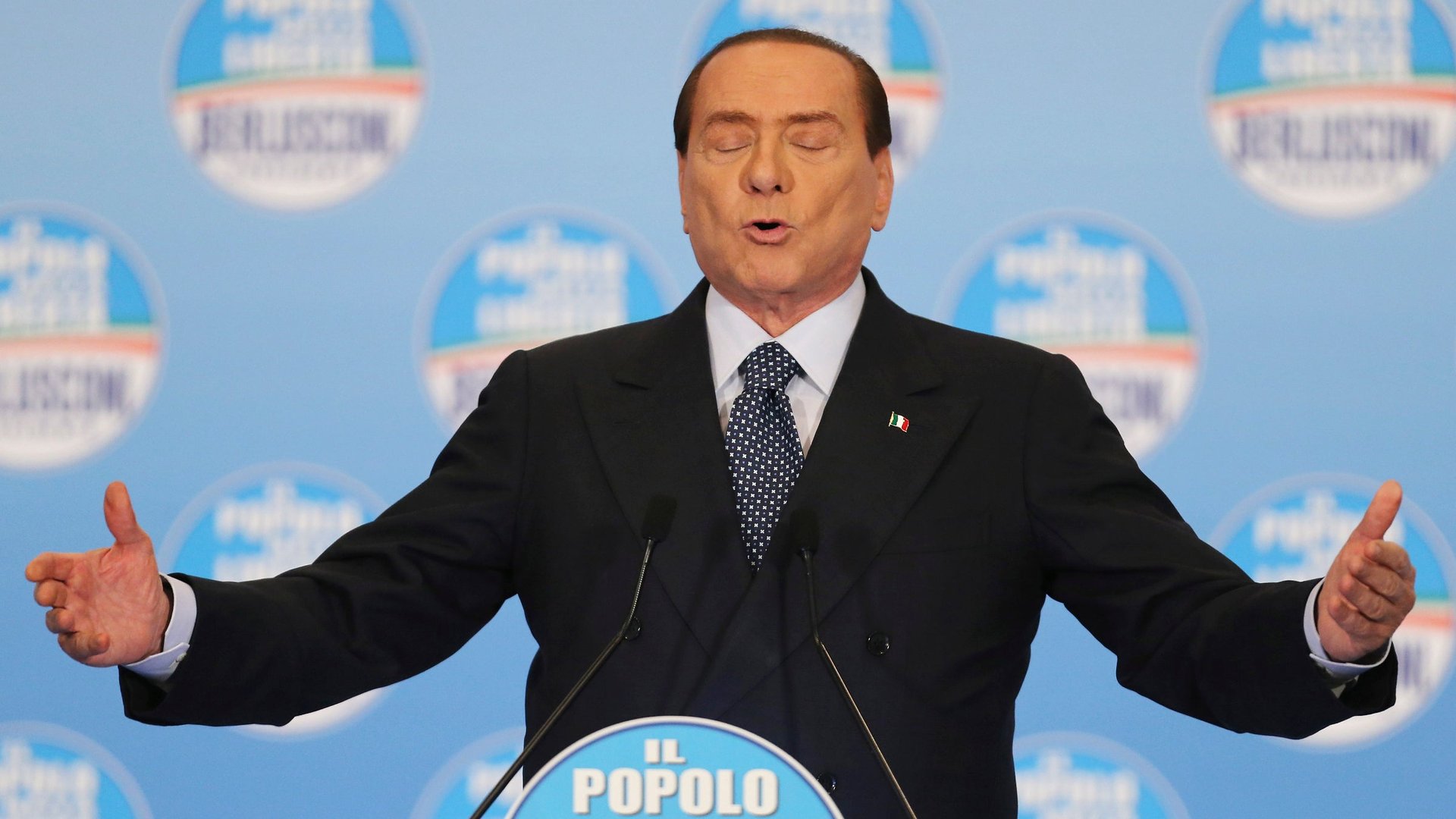Can Berlusconi win without controlling Italian TV?
In Italy, elections are fast-approaching, and Silvio Berlusconi, the former prime minister, is attempting a comeback.


In Italy, elections are fast-approaching, and Silvio Berlusconi, the former prime minister, is attempting a comeback.
After fiscal mismanagement lead to the tycoon’s ignominious exit from power in 2011, he was replaced by a government of technocrats whose unpopular austerity policies were implemented under pressure from bond buyers and other European countries. Now, to get back his old job, Berlusconi is turning to the last refuge of a scoundrel politician, promising massive tax cuts even as the country struggles to regain its budgetary footing. The proposal was widely mocked:
Corriere della Sera, Italy’s leading paper, ran a cartoon depicting him dressed as a smiling joker in a carnival outfit throwing coins and banknotes to everyone in his wake.
[Berlusconi’s replacement as prime minister, Mario Monti] called Berlusconi “a snake charmer” and accused him of trying to sell “a dream even more fantastic than that in Alice in Wonderland”.
Just about the only comfort Berlusconi found in the media was in a headline in Il Giornale, a newspaper owned by his family: “Finally, More Money”.
Given the mockery outside of the media he owns, it’s only appropriate that a pair of economists have released a new study that shows how Berlusconi’s political ambitions benefited from his control of six of Italy’s seven national television channels from 1994 to 2011. When new digital broadcast technology allowed Italians to gain access to a wider media environment, the researchers tracked how bias changed voting patterns changed in regional elections:
Although the control of most pre-digital outlets by Berlusconi was widely known, the switch caused a drop in his coalition vote share by 5.5 to 7.5 percentage points. This effect is economically and statistically significant. Scaling the effect by 2005 Berlusconi supporters and non-voters who watched new channels in 2010, we estimate that at least 30% of them changed their voting behaviour after the switch-off of analogue TV. The effect was stronger in towns with older and less educated voters. At least 30% of digital users had not filtered out the bias from 1994 to 2010. Moving to digital TV affected voting via turnout. Previous Berlusconi supporters went to vote less than others, hence his vote share dropped.
Berlusconi’s long and scandal-ridden political career clearly benefited from his control of the mass media. If 5% to 7% of the vote doesn’t sound like a lot, keep in mind that Berlusconi’s Forza Italia coalition came to power in 2008 with 47% of the vote, and in 2006, when Berlusconi was defeated after a five year term, he only lost by 0.1% of the vote.
Now, without the benefit of controlling nearly all television—and after a crisis—Berlusconi is at somewhat of a disadvantage in the elections, which will be held Feb. 24 and 25. On the other hand, since he announced his comeback run, the center-left’s polling lead has begun to dwindle.
Media bias or no, the apparently irrepressible Berlusconi may indeed bring bunga bunga back to the Palazzo Chigi—and raise blood pressure among investors and officials who hope Italy will have a stable administration to guide it out of the European financial crisis.
Update: Berlusconi hasn’t just faced political problems from competitors in the TV world. They’ve also put pressure on the bottom line at Mediaset, the television company he and his children control. Now, his political advisors are urging him to distance himself from the company by putting it in a blind trust, and some of the company’s executives agree that the move makes good business sense.